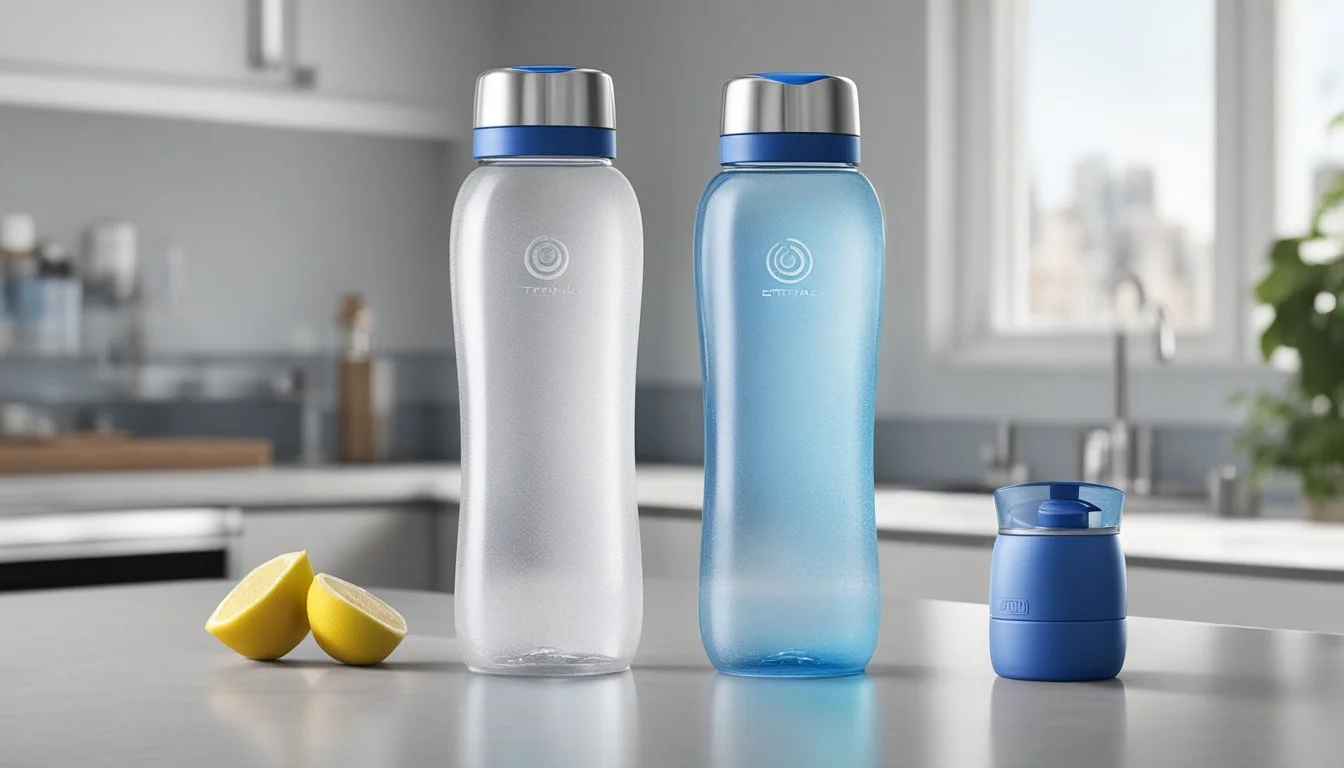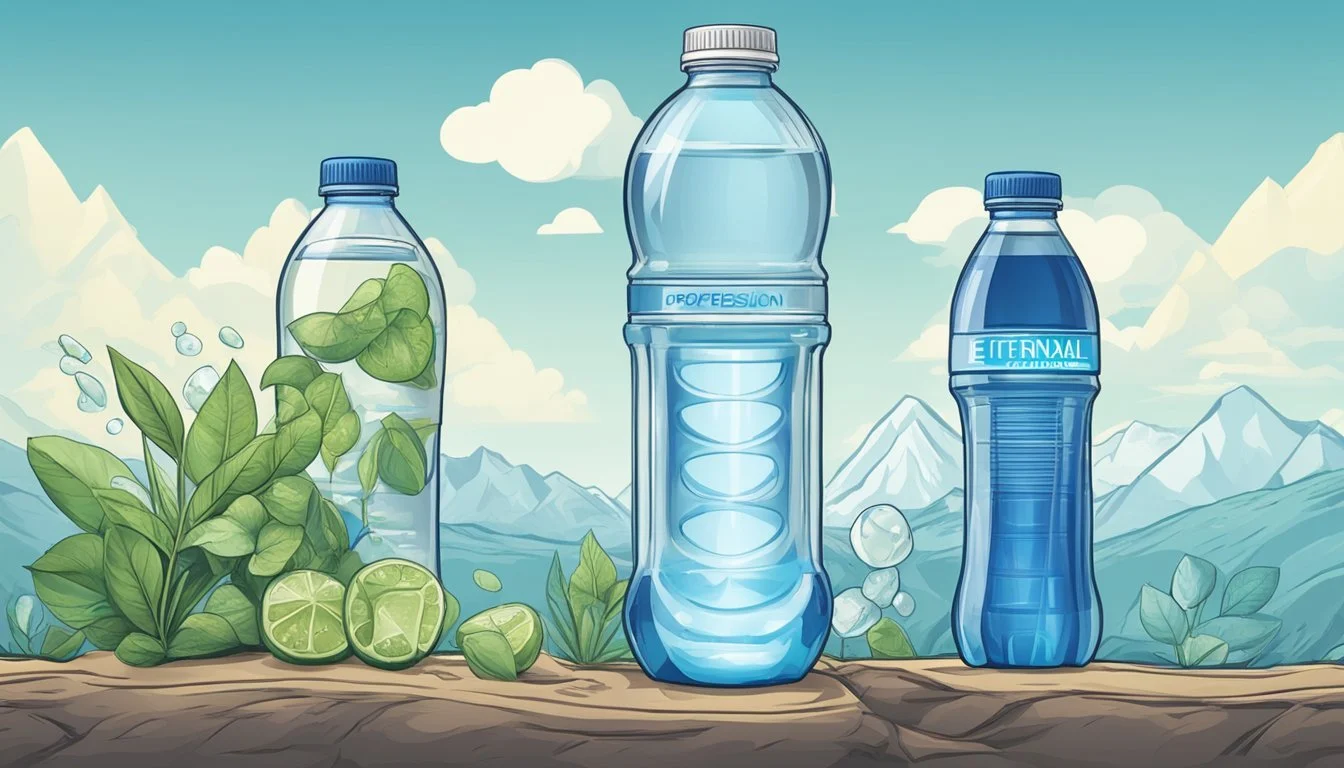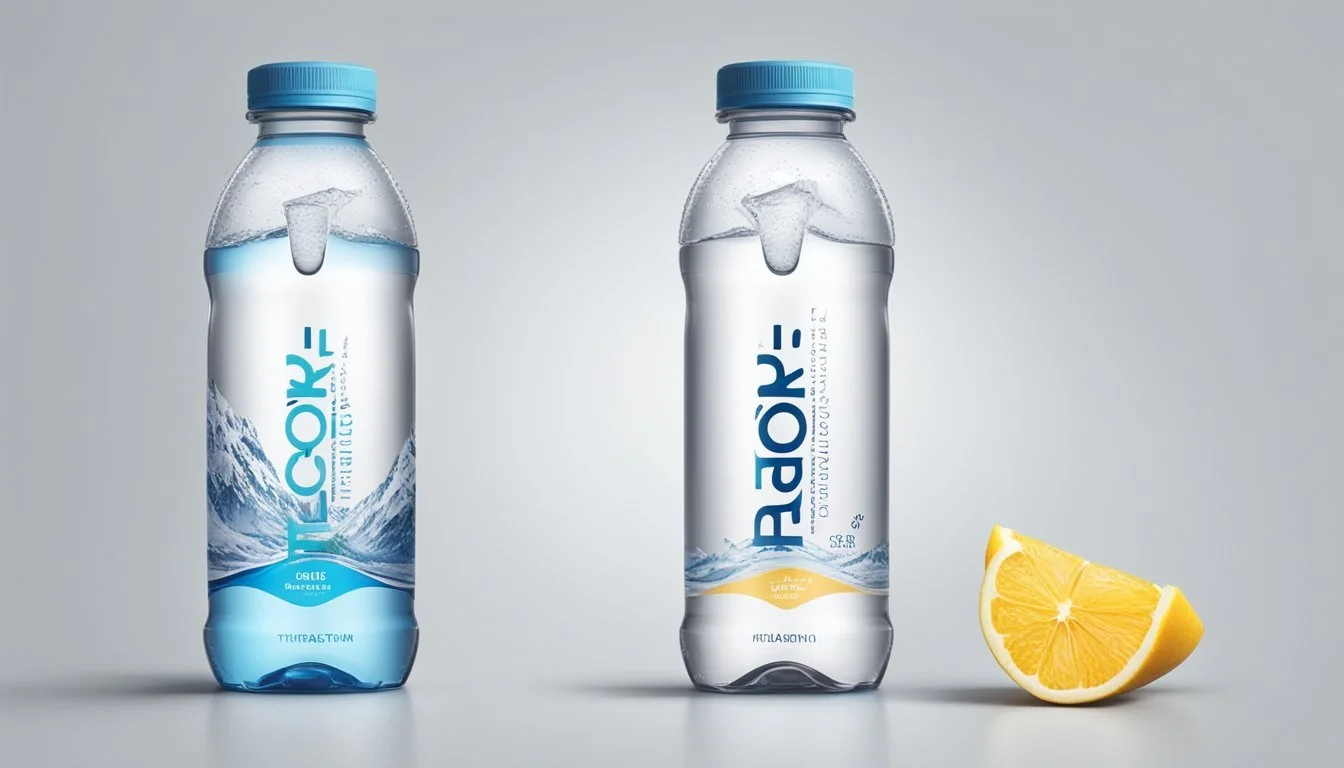Core Hydration vs. Eternal
Comparing Quality and Taste in Bottled Water
Selecting the right bottled water can be more complex than simply choosing between tap and bottled options. With numerous brands flooding the market, each boasting unique sources and purification processes, consumers increasingly scrutinize what goes into their bodies. Core Hydration and Eternal are two brands that stand out for their claims of optimal pH levels and added electrolytes for better hydration. Both brands aim to deliver a product that not only quenches thirst but also contributes to overall wellbeing, yet they take distinct paths to achieve this goal.
Core Hydration emphasizes its ultra-purified water, which is infused with electrolytes and minerals for taste. It is carefully balanced to match the body's natural pH level of approximately 7.4, positing that this harmony is conducive to maintaining hydration and overall health. On the other hand, Eternal offers naturally alkaline spring water sourced from protected underground springs, boasting a blend of natural minerals and electrolytes without any additional processing to adjust its pH.
In comparing Core Hydration and Eternal, one must consider factors such as the source of the water, the presence and balance of minerals, the purification process, taste, and the potential health benefits offered by the alkalinity and electrolytes. Both brands claim an edge in creating a superior bottled water, but preference often comes down to the individual's priorities, whether it be taste, the method of purification, or the natural mineral content.
Understanding Hydration and Its Importance
Hydration refers to the body's ability to maintain a balance of fluids. It is a crucial element for maintaining health and facilitating bodily functions. Water is the primary agent of hydration and is essential for cells, tissues, and organs to perform optimally.
Key Aspects of Hydration:
Cell Function: Cells require water to regulate temperature, transport nutrients, and remove waste.
System Regulation: Adequate hydration supports the cardiovascular system, assists in digestion, and aids in joint lubrication.
Hydration is also closely tied to electrolytes—minerals like sodium, potassium, and magnesium—which help to balance the body's fluid levels.
Importance of Electrolytes:
Maintain fluid balance
Support nerve signaling
Help with muscle contraction
An individual should consume water throughout the day to replace fluids lost through sweat, urination, and breathing. While both Core Hydration and Eternal bottled water provide options for maintaining hydration, their mineral content and pH levels may cater to different user preferences.
Comparing Electrolyte Presence:
Core Hydration Eternal pH Balanced at 7.4 Various Minerals Enhanced Naturally occurring
In summary, proper hydration, facilitated by the intake of water and balanced electrolytes, is fundamental for health and well-being. The choice between different types of bottled water like Core Hydration and Eternal can depend on factors such as the presence and type of electrolytes they contain.
The Basics of Bottled Water
Bottled water is a convenient and widely available resource, ranging from purified water to natural spring water. It is subject to various filtration and purification methods before reaching consumers.
Purified water, for example, often undergoes reverse osmosis, where water is forced through a semipermeable membrane to remove impurities. This process effectively eliminates dissolved ions and particles, ensuring safety and improving taste.
Natural spring water comes from naturally occurring springs. It is valued for its minerals and is typically filtered to remove contaminants while preserving its mineral content.
The table below summarizes the key characteristics of bottled water types:
Type Source Filtration Methods Common Characteristics Purified Water Municipal or natural sources Reverse osmosis, distillation, deionization Free from chemicals and contaminants Spring Water Underground springs Microfiltration, ozonation Contains natural minerals
Bottled water companies assert that their products meet stringent safety standards set by food and beverage authorities. They often highlight their unique purification processes to ensure high-quality, safe-to-drink water.
While reverse osmosis stripped water is sometimes enhanced with electrolytes for taste, natural spring waters tout a naturally balanced pH and electrolytic profile. Consumers typically make their choice based on factors such as taste, source, purity, and mineral content.
Core Hydration vs. Eternal Water: Brand Profiles
When choosing between Core Hydration and Eternal Water, consumers weigh factors such as purification processes, health benefits, environmental impact, and brand reputation. Each brand has distinct characteristics that cater to various preferences and priorities.
Core Hydration Overview
Core Hydration is known for its ultra-purified water, which boasts a balanced pH level of 7.4, matching the human body's natural pH. The water is infused with electrolytes and minerals for taste and hydration effectiveness. It targets consumers seeking water that supports optimal hydration and health benefits.
Eternal Water Overview
Eternal Water comes from natural spring water sources and is naturally alkaline, with a pH level that can range from 7.8 to 8.2. A key characteristic of Eternal Water is its natural minerals and electrolytes, which contribute to bone health and hydration. This brand appeals to those who favor alkaline water for its health benefits.
Comparing the Brands
Core Hydration is ultra-purified and electrolyte-enhanced.
Eternal Water offers naturally alkaline spring water.
Environmental Impact
Core Hydration: Uses BPA-free plastic bottles, with initiatives for sustainability.
Eternal Water: Provides BPA-free options and emphasizes the natural environmentally friendly sourcing of its water.
Health and Wellness
Both brands include electrolytes and minerals for improved hydration.
Eternal Water's natural alkaline properties may appeal to those interested in bone health and maintaining a balanced body pH.
Taste and Texture
Core Hydration: Purified for a clean taste with added electrolytes for a smooth finish.
Eternal Water: The natural minerals may give it a distinct, crisp taste compared to other bottled waters.
Water Sources and Purification
Core Water undergoes a multi-step purification process, including reverse osmosis.
Eternal Water sources from protected natural springs, with minimal processing to maintain its natural composition.
Cost Considerations
Core Hydration tends to be competitively priced among premium water brands.
Eternal Water may command a higher price due to its natural spring water origin.
Market Presence and Accessibility
Both brands are available in major grocery stores, including Whole Foods.
Core Hydration has gained visibility through partnerships with brands like Coca-Cola.
Consumer Trust and Brand Reputation
Core Hydration has established trust with clear nutritional information and a focus on hydration.
Eternal Water is trusted for its natural and pure sourcing, appealing to consumers who prefer natural alkaline water.
Unique Selling Propositions
Core Hydration emphasizes matched body pH and enhanced hydration.
Eternal Water stands out with its natural alkaline advantages and source purity.
Packaging and Design
Core Hydration: Distinctive design with a focus on eco-friendly materials.
Eternal Water: Uses traditional plastic bottles and also offers glass bottles for select markets.
Analyzing the Quality of the Water
When considering the quality of bottled water, factors such as pH levels, mineral content, and the presence of contaminants play crucial roles. Both Core Hydration and Eternal water brands emphasize the purity and health benefits of their products, taking these aspects into account.
pH Levels and Alkalinity
Core Hydration boasts an optimal pH level that matches the human body's natural pH balance, typically close to 7.4. This level is maintained through a proprietary blend of minerals and electrolytes. On the other hand, Eternal water is naturally alkaline, with a pH balance that ranges from 7.8 to 8.2, derived from its unaltered natural mineral content. Alkaline water has been suggested to provide several health benefits, though these claims often require further scientific backing.
Mineral Content
Both brands contain vital minerals like calcium, magnesium, and potassium, which are beneficial for hydration and overall health. Core Hydration uses a process of reverse osmosis to remove impurities, then adds a blend of minerals back into the water. Eternal water sources its water from natural springs, resulting in a naturally occurring mineral blend. The specific concentrations of these minerals vary between the two brands.
Mineral Core Hydration (amount) Eternal (amount) Calcium X mg/L Y mg/L Magnesium X mg/L Y mg/L Potassium X mg/L Y mg/L
Note: Specific mineral amount (X, Y) data is not provided and would need to be obtained for an accurate table.
Presence of Contaminants
Concerns regarding contaminants such as heavy metals (lead, arsenic, mercury) and PFAS chemicals are critical when evaluating water quality. Both Core Hydration and Eternal assert that their water undergoes rigorous testing to ensure it is free from harmful levels of these substances. Core's reverse osmosis filtration is recognized for its ability to significantly reduce the presence of contaminants like lead, while Eternal relies on the natural purity of its source and asserts that it tests for the absence of arsenic, mercury, and other heavy metals.
Health Impact of Consumption
Consuming bottled water like Core Hydration and Eternal can have various health impacts, especially concerning hydration effectiveness, mineral intake, and the presence of contaminants.
Hydration and Electrolyte Balance
Core Hydration asserts that it has a pH balance of 7.4 and is enhanced with electrolytes. A proper electrolyte balance is vital for maintaining hydration levels within the body, aiding in muscle function, and regulating blood acidity. Eternal Water, boasting a mineral-rich composition, similarly aims to improve hydration. Studies indicate that electrolyte-enhanced waters can have positive effects on hydration and exercise capacity.
Minerals and Bone Health
Eternal Water is categorized as a natural spring water, enriched with minerals from underground aquifers. The presence of calcium and other minerals may contribute to bone health. While regular consumption of mineral water can offer a beneficial intake of these nutrients, it is essential to evaluate the specific mineral content of each brand to understand their potential health benefits.
Potential Risks from Contaminants
Despite the advantages, bottled water may also contain contaminants. There is a concern over heavy metals, such as lead and arsenic, or PFAS chemicals (per- and polyfluoroalkyl substances), which could pose health risks. It is crucial for manufacturers to monitor their water sources and for consumers to be aware of any potential contaminants that may be found in bottled water products they are purchasing.
Comparison with Other Bottled Waters
When comparing Core Hydration and Eternal with other popular bottled waters, key differences emerge in terms of mineral content, pH levels, source, and presence of electrolytes. These factors influence the taste and potential health benefits of each brand.
vs. Smartwater
Smartwater is vapor-distilled with added electrolytes for taste. Core Hydration also incorporates electrolytes but prides itself on its balanced pH of 7.4, aligning closely with the human body's natural pH. Eternal differs by sourcing natural water with naturally occurring electrolytes and minerals from protected underground springs.
vs. Fiji
Known for its natural artesian source, Fiji water boasts a high electrolyte content and a smooth taste due to its unique mineral profile. In contrast, Core Hydration emphasizes its ultra-purified nature and added electrolytes and minerals for optimal hydration. Eternal often draws attention for its balanced mineral ratio and alkaline pH, which may enhance hydration.
vs. Iceland Glacial
Iceland Glacial water originates from the legendary Ölfus Spring in Iceland, offering exceptional purity and a naturally alkaline pH level. While Core Hydration aims for alkalinity through its formulation, Eternal stands out with its naturally high pH, resulting from its untouched source in the Shasta-Trinity Alps.
vs. Voss
Voss water, sourced from Norway, is renowned for its low mineral content and clean taste. Both Core Hydration and Eternal contrast with Voss by highlighting their electrolyte-enhanced profiles, which cater to those seeking additional hydration elements.
vs. Evian
Sourced from the French Alps, Evian is characterized by its naturally occurring electrolytes and minerals. Core Hydration's added electrolytes and controlled pH level position it as an alternative designed for hydration and balance. Eternal resonates with consumers seeking naturally alkaline and mineral-rich water without artificial enhancements.
Consumer Preferences and Trends
Consumers today show a marked preference for tailored options in bottled water, reflecting specific tastes and lifestyle choices. They often decide based on factors like flavor, carbonation, and packaging material, which can influence their perception of taste and health benefits.
Flavored vs. Unflavored
Flavored: A growing segment of the market is drawn to flavored waters. Brands like LaCroix have popularized this trend, offering a variety of flavors without added sugars or artificial sweeteners, which appeal to health-conscious consumers.
Unflavored: Still, there remains a strong demand for unflavored bottled water, often chosen for its purity and the absence of any additional taste. Unflavored water is the choice for those seeking hydration closest to natural water forms.
Sparkling vs. Still
Sparkling: Carbonated waters from brands like Perrier and San Pellegrino are favored by consumers looking for an effervescent alternative to flat water. The sensation of bubbles and the subtle mineral taste often associated with these brands cater to a more refined palate.
Still Water: On the other side, still water maintains dominance in the market, prized for its refreshing simplicity and direct health benefits of hydration without the potential bloating effects of carbonation.
Bottles vs. Boxes
Plastic Bottles: Plastic remains the most common packaging material for bottled water, with convenience and lightweight properties as key advantages. However, consumer consciousness about environmental impact is growing.
Glass Bottles: Glass bottles, on the other hand, are often chosen for their reusability and perceived enhancement of water taste, potentially offering a cleaner taste free from plastic's influence.
Boxed Water: A newer trend is boxed water, which touts eco-friendliness due to recyclable packaging and a reduced carbon footprint. While still a small portion of the market, it is gaining attention as environmental concerns become more mainstream.
Environmental Considerations
When evaluating bottled water brands like Core Hydration and Eternal, the environmental impact is a significant factor. Often the sustainability efforts and packaging solutions of the brands are a concern for environmentally-conscious consumers.
Impact of Plastic Bottles
Core Hydration and Eternal waters often come packaged in plastic bottles, which are a major environmental concern due to their non-biodegradable nature. Plastic bottles take hundreds of years to decompose, contributing to landfill growth and ecological distress.
Sustainability: Both Core and Eternal claim to use BPA-free plastic, which reduces the exposure to harmful chemicals but doesn't solve the issue of plastic waste.
Recycling: While these bottles can be recycled, the actual rates of recycling remain low. It’s estimated that only about 30% of plastic bottles are recycled, leading to significant environmental consequences.
Consumers can look for recycling instructions on the labels to ensure proper disposal.
Sustainable Packaging Solutions
Bottled water companies have been exploring alternative packaging solutions to reduce their environmental footprint.
Environmentally Friendly Options:
Glass Bottles: Some brands offer water in glass bottles, which are 100% recyclable and can be reused more times than plastic.
Boxed Water: An alternative packaging that is gaining attention is boxed water, made from paper, which is biodegradable and easier to recycle.
Core Hydration emphasizes its eco-friendly packaging design, while Eternal has explored sustainable practices within its sources and operations. Companies should continue to innovate in this area to minimize their environmental impact.
Conclusion
Choosing between Core Hydration and Eternal Water depends on individual hydration needs and preferences. Both brands offer quality bottled water options, but with distinct features that might cater to different audiences.
Core Hydration is renowned for its:
Ultra-purification process: Involving reverse osmosis and UV light.
Electrolyte enhancement: Aiming for a balanced pH and better hydration.
It is a choice for those seeking water that supports active lifestyles and requires additional electrolytes for exercise recovery.
Eternal Water is recognized for its:
Natural source: Arising from protected underground springs.
Environmental consideration: Advocating reduced impact through choice of source.
Core Hydration Eternal Water Purification Multi-step including UV Natural springs Electrolytes Added for taste and hydration Naturally occurring minerals Taste Consistent, due to purification Varies by source, often described as fresh Eco-Friendliness Packaging choices aimed at reducing carbon footprint Advocates eco-consciousness with spring water selection
Consumers should consider that bottled water is generally more expensive and less eco-friendly than tap water, but offers convenience and occasionally enhanced hydration benefits that some individuals may find necessary. It must be noted, however, that these benefits greatly depend on the local quality of tap water and personal health needs.
Ultimately, selection might come down to a balance of ethical considerations, cost, taste preference, and potential health benefits. It is essential to remain informed about both the product attributes and one's own hydration requirements to make the most suitable choice.






